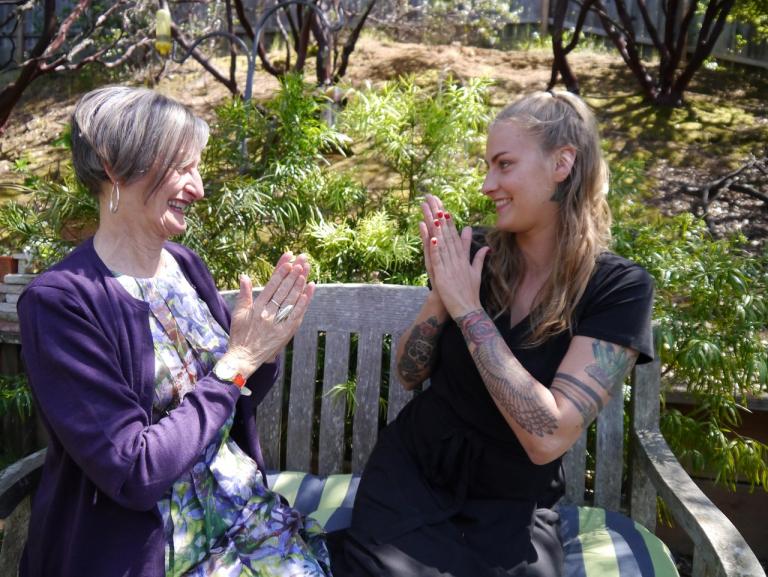Since I am an adult child of divorce who divorced with two children, I’ve always wondered about the rights of children of divorce. As a result, I interviewed hundreds of adults raised in a divorced homes to learn more about their perspective on this topic.

In fact, my research on children of divorce spans a few decades I’ve been impressed with the wisdom of respondents who are struggling to understand the impact of divorce on their lives and choices so they won’t repeat the past.
By the way, I’m not advocating that children of divorce adopt a victim mentality. I believe that all individuals are responsible for their own behavior and happiness. However, children of divorce often live for many years in situations where they are exposed to far too much conflict, stress, and loss. They often navigate living in the two worlds of divorced parents; and sometimes adjust to living with stepparents and stepsiblings.
10 rights of children of divorce:
- The right to love and be loved by both of his/her parents and stepparents without feeling the quilt or disapproval of either of their parents. If he/she decides to show open affection to a stepparent, they don’t deserve to feel badly about this and should be able to choose who they show affection towards or avoid contact with.
- The freedom to express their feelings (both positive and negative); and to have parents who listen and validate them. There are a lot of emotions associated with dealing with parental divorce and children need to feel that their parents can provide a safe harbor for them to be themselves and express a wide range of emotional reactions which may come and go into adulthood.
- The right to be free of being burdened by their parents’ emotional problems including anger towards their other parent. Most children love both of their parents and feel unnecessarily burdened by hearing about parental conflict or emotional issues stemming from their parents’ divorce or the aftermath. This includes infidelity, abuse, or financial issues. Children of divorce, of all ages, may experience guilt feelings if they aren’t able to love and be close to both of their parents. Elizabeth Marquardt cautions us that some children of divorce grow up too fast and to become “little adults.”
- The right not to experience loyalty conflicts or to have to choose one parent over another. With few exceptions, children of divorce are prone to experiencing divided loyalties. This means they believe that if they are close to one parent, they are being disloyal to another. As a result, it’s important for parents to encourage him/her to spend time with the other parent and to show some enthusiasm for their activities and relationship with them.
- The right to be kept informed about important schedule changes that impact their life and to have a say in them whenever possible. After divorce, children of divorce adjust better if they have a fairly predictable schedule that they can count on.
- The right to be protected from my parents’ anger toward my other parent. To a life that is not filled with conflict or bad-mouthing from either of my parents. Divorce expert Rosalind Sedacca writes: “Clearly, while it’s tempting to badmouth Mom or Dad for the way they’ve hurt you in the marriage, venting to the kids puts them in a very uncomfortable position. They love both of their parents and don’t want to hear from you about the ways your ex misbehaved or initiated your divorce.”
- A life that allows him/her to choose to go to college and have reasonable financial backing from both of their parents if possible. During many of my interviews of children of divorce, respondents have voiced their complaints about not having the comfort of financial support during their college years. In fact, one thirty-something teacher told me that her dad stopped paying her college tuition and she had to drop out of college until she could save enough to repay her college debt.
- The privilege of spending more time with one of his/her parents for special events or occasions without feeling guilty (for leaving the other parent out). Children of divorce should never be made to feel guilty for wanting to spend more time with one of their parents. According to Rosalind Sedacca, “Here’s the key point: as a parent you need to understand that when a child expresses love, admiration or respect for their other parent, it doesn’t diminish their love for you.”
- The right to spend time with their friends even if it interferes with the parenting plan. As I said earlier, children are not “little adults’ and they benefit from social time with peers to foster their social and emotional development. As a result, parents need to encourage their kids to have plenty of down time and outings with peers – even if it interferes with their time with one or both of their parents.
- The right to be a kid and to enjoy his/her status as such! Sedacca writes, “Let them be kids. Never burden them with adult responsibilities or communication. Seek out other families who have experienced divorce as part of a new network. This can provide support and new friends for you as well as your children.”
Children of all ages sense when their parents are cooperating and this will mean the world to them and help them feel calmer and to have fewer divided loyalties. Never bad-mouth your ex in front of your kids or make disparaging comments about them such as “he never pays child support on time,” or “what was she thinking marrying someone who can’t get a decent job.”
After divorce, it’s your responsibility, as a parent, to stop blaming your ex-spouse and recognize that divorce forever pits children (even as adults) between their parents’ two different worlds. It takes practice and skill to encourage resilience in your children by adopting a forgiving mind-set as well as faith and optimism for the future.
With courage and persistence, children of divorce can develop healthy, long-lasting intimate relationships and create a new path towards trusting significant others. In fact, you can go into relationships with your eyes wide open and use your past as an opportunity to pick a partner who is a good match for you. Be sure not to give up your personal power and don’t settle for less than you deserve from intimate partners. I wish you well on your journey of healing, forgiveness, and love!
Follow Terry on Twitter, Facebook, and movingpastdivorce.com. Terry’s award winning book Daughters of Divorce: Overcome the Legacy of Your Parents’ Breakup and Enjoy A Happy, Long-Lasting Relationship was published in January of 2016 by Sourcebooks.
I’d love to hear from you and answer your questions about relationships, divorce, marriage, and remarriage. Please ask a question here. Thanks! Terry












